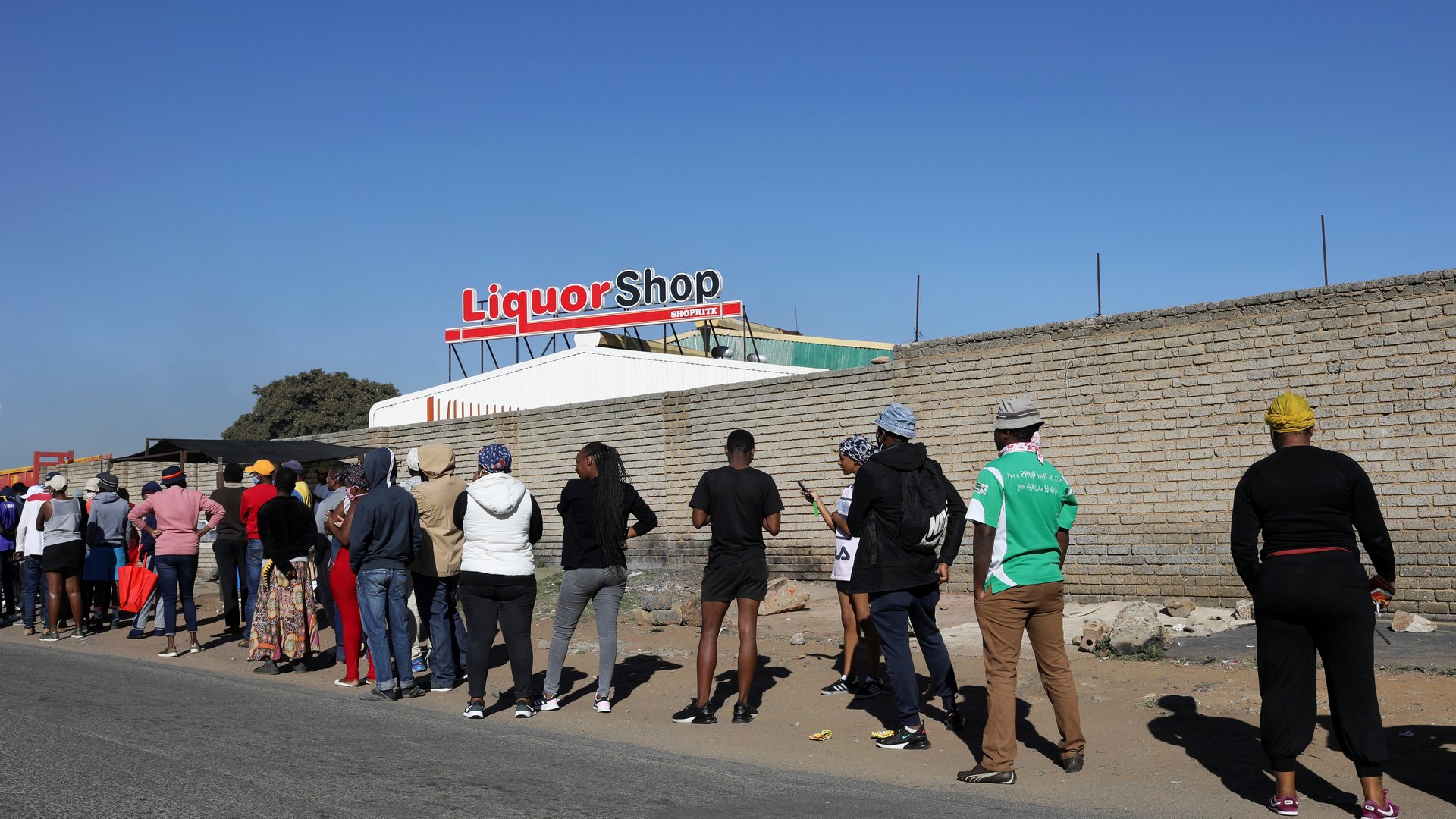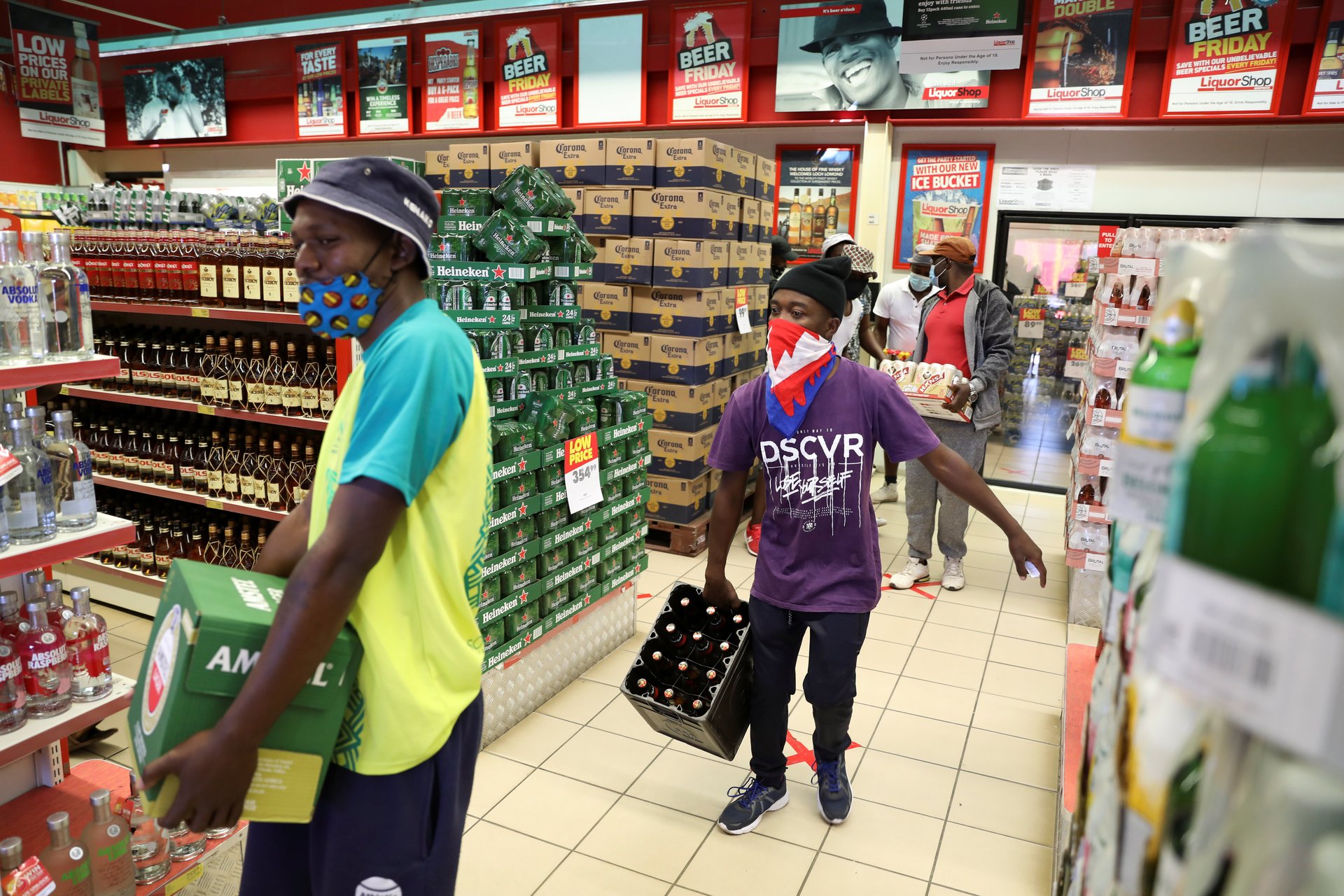South Africa’s long-standing alcohol abuse problem reemerged a day after lifting a lockdown ban
Just 24 hours after South Africa’s coronavirus-responsive ban on alcohol sales was lifted, there are already calls for it to be reinstated.


Just 24 hours after South Africa’s coronavirus-responsive ban on alcohol sales was lifted, there are already calls for it to be reinstated.
On social media, the hashtag #alcoholmustfall was trending on Tuesday (June 2), and the far-left opposition party EFF (Economic Freedom Fighters) said it would hold president Cyril Ramaphosa personally responsible for any deaths resulting from the booze ban being lifted.
The ban of alcohol and cigarettes sales was one of the more unusual features of South Africa’s strict lockdown imposed on Mar. 27 to stop the spread of Covid-19 infections in the African country which already has the highest number of confirmed cases on the continent.
On Monday the first day the ban was lifted saw long lines outside stores as South Africans stocked up. After more than two months of not being able to legally purchase their preferred tipple, South Africans came out en masse on the morning of the lifted ban; some lining up as early as three hours before shops officially opened.
Even while queuing, there was much jubilation from buyers with many posting videos of singing and dancing during what became a social engagement, hampered, only in a minor way by the wearing of masks and the practicing of social distancing. Excited shoppers reflected a diversity of ages, races and individual as well as registered vendors such as tavern owners.

Some of those who rushed out to buy booze wanted to do so in case the country experiences a surge of Covid-19 cases and returns to stricter restrictions.
By Tuesday, sales were markedly slower and calmer following long queues at alcohol retailers around the country.
Reservations expressed by citizens in the past day however may contribute towards government revisiting allowing alcohol sales.
South Africa, Sri Lanka, Botswana and Panama, were the only four countries in the world to implement a national ban on alcohol sales during lockdown. Less than a month in, South Africa’s Health minister, Dr Zweli Mkhize, reiterated why he believed this had been the right decision.
“We have to rely on people’s sober judgments to conduct themselves in a way that can encourage distancing, people following coughing etiquette and hygiene. Alcohol reduces any individual’s capacity. We believe that it is not something that is really helpful in Covid-19 management.”
He also linked the a decrease in trauma accidents at hospitals with a reduction in alcohol availability.”Fewer people have been involved in accidents and fewer people have been stabbed.”
According to Charles Parry, director of alcohol research at the South African Medical Research Council, the ban has resulted in fewer admissions to trauma units per week, while the ban combined with decreased vehicle use may also have led to a decrease in excess deaths.
The country does have some aggravating factors that could be used to justify an alcohol ban including the world’s highest rate of foetal alcohol spectrum disorder (FASD), an umbrella term that includes effects and symptoms caused by drinking during pregnancy.
The ban has however sparked illicit trade with smugglers bringing in contraband from South Africa’s neighboring countries. There has also been a growth in the number of patients being treated for illnesses related to home brewed alcohol, as well as a few reported deaths.
Shops that sell booze have also suffered burglaries.
Shoprite, a major retailer with branches across Southern Africa, is offering a monetary reward for information, following a robbery at one of their Johannesburg stores. After tunneling below the shop, the thieves gained access and made off with almost $18,000 worth of stock including whiskey, brandy, gin, cider, vodka and beer.
Now that alcohol sales are legal again, illicit trade and looting may decline. Drink-related accidents however are already on the rise after just one day.
Sign up to the Quartz Africa Weekly Brief here for news and analysis on African business, tech and innovation in your inbox